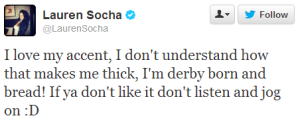So Weird Al Yankovic is back. To completely lift the words of my brilliant friend Stoo, “you remember Weird Al, right? He was last popular around the same time as nothing at all, ever”. On Tuesday night, I watched his second video-a-day offering (following Monday’s ‘Tacky’, a daft but vaguely entertaining ditty to the tune of Pharrell’s ‘Happy’). Called ‘Word Crimes’, it’s set to the tune of omnipresent twat-anthem Blurred Lines by Robin Thicke, and is a lighthearted riff on the mistakes people make in written and spoken language. OR IS IT? (Clue: it isn’t.)
As soon as I read that blurb, I inwardly sighed. Then as I watched it, I outwardly sighed. A lot. I knew within hours it would be a viral hit with the ~liberal educated Internet crowd~ (of which I am one, I hasten to add), and was proved right when I opened Facebook this morning and several friends had shared it and sung its praises.
Don’t get me wrong, some of the wordplay is solid (rhyming “educate ya” and “nomenclature” definitely raised a smile) and god knows I’d rather listen to a less sexually predatory version of that song (“You would not use ‘it’s’ in this place” was slightly more palatable on the ears than “You the hottest bitch in this place”.) But it’s gross. It sums up everything that’s wrong with the current ~liberal educated Internet crowd’s~ habit of mobilising themselves as some kind of Language Army, taking down anybody who doesn’t conform to one particular type of English in order to cleanse the human race of morons and half-wits (read: to mutually pat each other on the back and bask in their collective superiority complex).
inb4 “Oh GOD you’re such a killjoy” – maybe I am. But this isn’t just some random video. This is going viral, will be watched by millions, and will inevitably be used for months to come by pedants to try and validate their weird obsession with making people feel bad about themselves.
English is the second most-spoken language in the world, behind Mandarin. It’s also the most-spoken second language in the world, and while totals are near-impossible to estimate, it’s probably reaching the point where almost a billion people speak some kind of English to some degree of fluency. A seventh of the population of Earth. That’s pretty cool (if you don’t think too much about the fact that it’s mostly because of colonialism/general douchebaggery that this is the state of affairs), and it’s pretty sweet that so many people can communicate with this one language. The language being spoken in so many places inevitably means it’s going to change. Language changes constantly; that’s just a fact of life, inevitable, and most definitely not negative. There’s a chance, owing to the vastness of its number of speakers, combined with the near-instant communication a huge number of us have access to and the dominance and reach of English language media, that these changes will be accelerated, and have been over the last few decades.
Now, I don’t know if you’ve noticed this, but society hasn’t collapsed in on itself just yet. As the English language has spread and changed; as we’ve introduced thousands of new words; as some of us have started using “was like” instead of “said” as a quotative; as people have occasionally spelt words with numbers in emails and text messages; as second person indirect pronoun “whom” has started to be used less often — the world has not spontaneously imploded or been sucked into the cavernous mouth of a hell-demon. Also, we can still communicate as effectively as ever.
And, funnily enough, hundreds of years ago when English lost its case inflection system, and the pronouns “thee” and “thou” (leaving “you” to act as both singular and plural second person signifier), and when the Great Vowel Shift caused (among other things) the word “night” to change from ‘nikt’ to ‘nayt’, we also didn’t spontaneously combust. In fact, we continued progressing to a society that now has stuff like 3D printed organs and peanut butter cup ice cream. Changes in language don’t mean that we as an English-speaking population will grind to a halt due to being unable to successfully communicate with each other. It just doesn’t. We adapt to the changes (even if that means a couple of instances of minor miscommunication, which are easily overcome) and then we carry on our merry way(s).
It’s natural to fear and reject the unfamiliar, I get that. But it’s only since the formalisation of arbitrary grammar rules and regulations that deviating from this perceived norm has resulted in pointing fingers and accusations of being “raised in a sewer”. Until the 17th Century (ish), without a formal way of printing language and very little in the way of transport, English was spoken differently in different places with no real bother. Then BAM, industrialisation. Trains! Roads! A conscious class system! At some point, those in the South East (London-based, mostly) decided that the way they spoke was the proper way. And, having the money and facilities open to them, decided to write books to that effect, books that ended up in schools and which still inform English language teaching to this day. Now, this isn’t in itself a completely terrible thing. Language teaching is good, it gives people a tool for communication, etc. etc.
BUT, these books stated that anything that deviated from this South Eastern standard was wrong. Now, it’s not like everyone outside of this area was bellowing at each other and/or shrugging their shoulders until this point, completely unable to communicate. No, they had lives and communities and workplaces and everyone got along merrily. As soon as these kind of books were published (and listened to), the language that people outside the SE of England spoke became wrong. Bad. Defective. Immediately. Through luck and social circumstance, one variety of English got picked to be the proper one, and from then on it became okay to mock, deride and ridicule anybody who deviated from that, despite the fact that their own varieties of English were equally adequate at communication. The upper classes, then (for it was these who wrote said books), had yet another way to disregard the thoughts and opinions of the lower classes, because if they couldn’t speak properly (i.e. adhering to the rules the rich folk made up), then they were barbaric and weren’t worth listening to anyway.
“But that happened hundreds of years ago, Hannah! That is sooooo 18th Century!” I know that, but the exact same kind of message is put out in these videos, and by grammar pedants like this little shit. The only reason to gloat and sneer when people deviate from a rule (that is often not relevant any more) is to get some kind of moral superiority and dismiss them as inferior. It’s founded in classism (and often these days, racism, as a lot of this bile is targeted towards non-native English speakers who, let us not forget, are fluent in at least one whole other language too and that’s pretty damn impressive doncha think?) and it’s gross. Particularly considering – in this example – the rules being upheld are ones which are fading away for the most part because they don’t serve a communicative purpose any more.
“Whom” is used less often now because not using it doesn’t directly impair the understanding of a sentence. You know what the person means anyway. In fact, if you’re pointing out a ‘mistake’, you must understand them in the first place in order to do so. People who dangle participles or use the newer, extended emphatic meaning of “literally” or use single letters to occasionally replace words are not, as Al states, “incoherent”. They’re perfectly coherent, and their communicative purpose is unimpaired – you just don’t like it, and want to make them feel bad about it.
And boy, does this song do that. “You’re a lost cause.” “You dumb mouth breather.” “Get out of the gene pool.” “That literally makes me want to smack a crowbar upside your stupid head.”
inb4 “It’s just a song, he’s using those phrases to make it rhyme and sound funny!” Oh believe me, you don’t have to delve far into the Internet to see identical comments being made by the self-proclaimed ‘grammar police’, and in conversations on the topic the sentiment remains very similar.
There’s a lot of reasons a person might not know that ‘whom’ is the indirect version of a second person interrogative pronoun. Maybe they’ve never heard it (because of how it’s dying out). Maybe they were never formally taught it, whether it was omitted from their English lessons, or they didn’t progress through the education system to the point where this is taught. Maybe they’re a second language speaker, and haven’t got to the level of fluency to easily use it. Maybe they’re dyslexic, or have another kind of language impairment. Telling any one of these people to “get out of the gene pool” is obscene. It’s demeaning and cruel, and purely to make them feel small and you feel big. Can you imagine being told that? Being hounded for not following a certain rule, even though the main function of your speech or writing (i.e. communication) was successful?
Just stop. Stop the grammar police. Stop hurling wildly hyperbolic insults at people for daring to deviate from a standard. Accept that language changes, and that it’s okay. Encourage people to learn language so we can all communicate more and easily, but don’t shit on them if their version of it is different to yours. It’s classist bullshit, and it’s so 2010.
Also, I should stress, this charming parody song includes the line “you write like a spastic”, and really, that is reason alone to throw it in the bin.
tl;dr – the English language is not a sacred thing we must uphold at all costs, and being nasty to people who deviate from a set of outdated and arbitrary rules makes you an asshole.
NB. For a less-sweary, better-articulated version of this response, you can do no better than Lauren Squires or Stan Carey, both of whom are excellent.
EDIT 23/07/13 – So some of the feedback I’ve had on this post has been amazing, and some not so positive – that’s cool, obviously, I barely agree with myself half the time so I don’t see why everyone else should! I just wanted to address a couple of points raised:
1. I spelt Weird Al’s surname incorrectly. My bad, genuinely sorry about that, have changed it now.
2. As a native speaker of British English, I reacted badly to Al’s use of the word “spastic” in the song, as over in the UK it’s a pretty horrid ableist slur. Having read up on it (thanks to an informative post here), I see the same word in US English has a far less offensive meaning, akin to ‘klutz’. I also see Al has sincerely apologised to British listeners who didn’t like it. Fair play, that one’s on me too.
2.5. 24/07/13 – Okay, I slept on this one, and a couple of comments have made me decide that, actually, my discomfort with the word still stands. Regardless of its innocuous status in US English, the word’s roots are still pretty ableist, and I think it should have been (and should be) avoided.
3. A few people have said that the song is a parody of prescriptivism and language policing itself, and that I have entirely missed the point. I’m afraid it doesn’t look like that’s the case – Al has spoken about the song, and confirms that he holds the beliefs it puts forward about ‘proper grammar’.
“People that know me (or have seen the grammar-related videos that I’ve posted on my YouTube channel) don’t doubt my credentials as a grammar nerd, so it was obviously a real joy to be able to vent about some of my pet peeves in a song parody.”
Alas.




